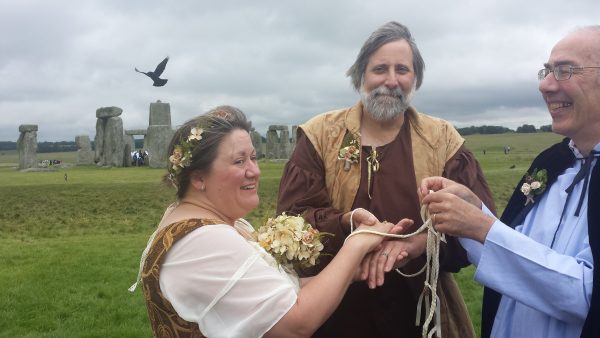
by Michael | Aug 23, 2016 | Blog
One of the many things that attracted me to the role of civil celebrant was the fact that I could offer wedding freedoms.
I could educate people that they had a choice. After all, we’re talking about what should be the biggest day of their lives.
The old way
Up until 2009, I assumed that marriage meant you either attended a full religious service, as in a church, or the register office (fully secular).
Of course, lifestyles have changed and society has become more accepting. For example, same-sex weddings have become quite commonplace. One of the favourite ceremonies I have conducted, as it happens, was same-sex.
Nonetheless, as I constantly realise from personal experience, many people are unaware that wedding freedoms exist.
Sure, the old choices are still feasible for those who want them.
The new
However, you may be a devoted couple who may not share spiritual beliefs. Happily, you can now have a romantic ceremony that includes what really matters to you. All of us have the freedom to commit to each other, surrounded by family and friends, in venues of our choice. We can invite our chosen civil celebrant to design and conduct beautiful, meaningful ceremonies.
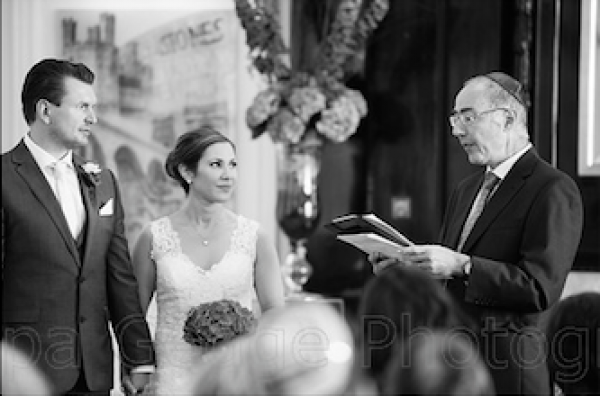
Photo: Philippa Gedge
I seem to be asked to help create a lot of part-religious ceremonies. Among them, I have led a full (well, 95%!) Jewish wedding, a wedding blessing for a Muslim and a Jewess, a Christian marrying a Jew (with a priest covering the Christian parts!) and a half-Jew marrying a pagan.
In this way, as long as the legal bits are dealt with by the registrars first, the exact degree of religiosity, of formality and tone are up to the couple. They can thus put their seal on the proceedings and make it an absolutely unique occasion.
The tailor-made service and the personalised style and special venue all contribute to a unforgettable, wonderful occasion – a far cry, for some, from the extremes of a full religious service or the register office.
I’m glad to say that we’ve come a long way from the rigidity of the past. Then you were offered only a standard 10 minute register office ceremony or a fixed, religious ceremony that was not unique to you and may have included words you were not comfortable with.
Those still work for people. But certainly not for everyone.
I believe that wedding freedoms surely make perfect sense, don’t they?
If you agree, please help me spread the word!
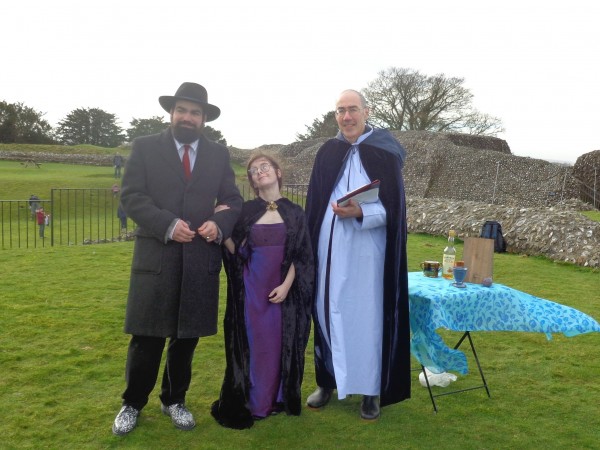
by Michael | Dec 29, 2015 | Blog
Although I do my best to get about and spread the word, I find there’s still a lot of confusion about what a civil celebrant really does and what they can offer. Perhaps I can clear things up a bit.
Imagine …!
What if a full religious wedding doesn’t rock your boat?
What if the totally non-religious, standardised Register Office ceremony isn’t really all that special for your big day?
What if you could go to the Register Office in the morning in your jeans, with a couple of witnesses, sign the marriage certificate and then enjoy a wonderful, joyous, memorable ceremony in the afternoon with all your guests?
Nowadays, you can. That’s where a civil celebrant comes in.
As long as the legal bit is still carried out, there’s nothing to stop you holding the ceremony you actually want – at the venue you want, in the way that you want.
The Ceremony
One of the beauties about a celebrant-led wedding is that he or she will help you (as much or as little as you want!) to build your own ceremony. So if you want a religious component (or perhaps one or two elements drawn from various cultural sources), put that in, by all means; if you want spiritual bits, go for it; poems and favourite texts are absolutely fine. With some give and take, you should be able to please yourselves AND keep your parents happy!
As with the readings, you decide on the music. You also decide on the choreography (who walks or stands where), the readers, any address, the wording, and delivery, of the Vows. Your celebrant will be pleased to advise and make helpful suggestions. This process is usually conducted by e-mail after an initial mutual fact-finding conversation (face-to-face or by Skype).
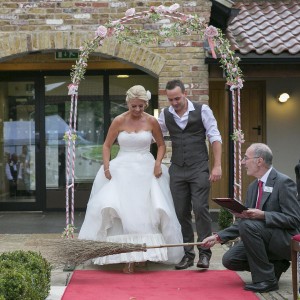
Ritual
You will be able to incorporate any rituals and little touches of your choice that would not otherwise be possible. For example, drinking from a loving cup, burning a Unity Candle, Jumping the Broom or celebrating a handfasting (an ancient Celtic betrothal ritual).
Conclusion
In short, this is YOUR day, and your civil celebrant, who will of course conduct the ceremony for you, will do everything to ensure that the day is unforgettable, meaningful and what YOU want.
I hope this clarifies things. If you still have questions, don’t hesitate to ask me! I’ll be delighted to help.
by Michael | Nov 3, 2015 | Blog
How difficult can planning a wedding be?
Well, don’t go asking that question to too many people!
Even if finances don’t enter into it (but they invariably do), you have so much to consider. Things like the venue, any theme you might be having, the reception, the dress, decoration, presents, catering, flowers, cakes, photographer, the guest list – it seems never-ending.
One thing people tend to overlook (or postpone) is the ceremony itself. In many cases, couples assume that the service must either be a full religious one or a register office ceremony.
You do not, however, need to put on that straight-jacket. In fact, you have a lot more choice than that. The only obligation you must comply with is to have your wedding legally documented. (This will normally be part of the full religious service.)
Another Approach
Not everyone is comfortable with a full religious service. Nor is it permitted for all, either. So what alternative is there, particularly if you want a personalised ceremony, which a register office service – or indeed, the church – won’t really offer?
You are quite welcome to celebrate your marriage wherever and however you wish (well, within reason!), once the registrars have done their bit. So you could go to the register office the day before your wedding in jeans, with two witnesses (remember to make an appointment first, though) to become legally married, and then appear at the venue of your choice, relaxed and happy, for what to all intents and purposes is your wedding. Then your celebrant can conduct the ceremony of your dreams that reflects your personalities and beliefs.
You can even have the celebrant-led ceremony directly after the registrars have left the room, if you want consecutive ceremonies.
Examples
This works particularly well for people of different religions who want at least a religious element, but cannot be married in their church/synagogue/mosque/temple etc. One ceremony I am conducting will include the bride’s mother, who is Russian, presenting icons and also bread to the couple. I have gladly put Jewish rituals and blessings into several part-Jewish weddings.
Some people don’t want any religion really, but are keen to keep their families happy, so choose to include a few token elements – maybe a religious reading, prayer or blessing.
Others want their wedding to stand out, so they may incorporate religious – or pagan – elements that are, to say the least, unusual. For example, they might appreciate a Unity Sand ceremony. Each of the couple has a container of sand – one might be red, the other blue. Together, accompanied by suitable words spoken by the celebrant, they pour the contents of their container into a funnel, and the different sands merge in a third container (which the couple take home) to symbolise their new unity.
Some may choose a handfasting – partial or total (I talked about this in a recent blog).
The point is that you can work together with your celebrant and put together your ceremony. It’s your big day, and you should be able to celebrate it as you really want. Let it be perfect for you.
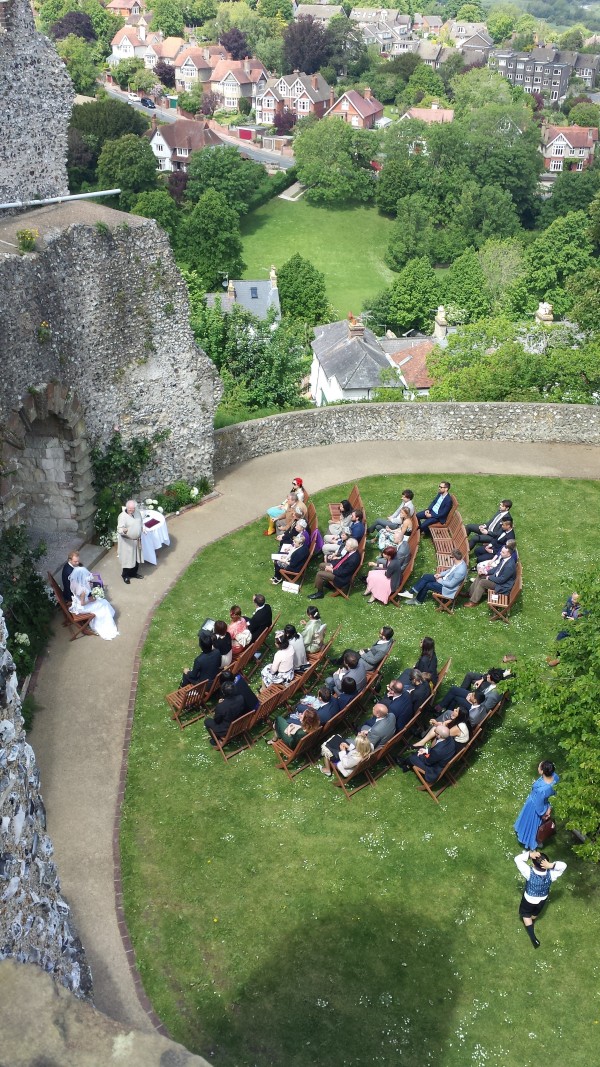
by Michael | Aug 11, 2015 | Blog
Where to have your wedding? The location is obviously one of the first things that couples want to arrange. For one thing, the more popular venues may be booked up a year or more in advance. Secondly, the atmosphere of the wedding can largely be dictated by the sort of venue chosen, so it’s not a decision to be taken lightly.
First considerations
Obvious things to consider are your budget. How much money do you want to devote to this? If you choose a less usual date or time of day, you may be able to secure the venue at a better price. Obviously, you will need estimates, possibly from several venues, before you commit.
The size of the venue is clearly important – you don’t want the wedding party engulfed in a huge area, but you certainly don’t want to be squashed together for the ceremony or reception. A preliminary visit, together with the events planner, is essential. Be prepared to ask lots of questions and be absolutely clear what the price actually includes.
Would you be intimidated by a castle setting, say, or do you want to push the boat out and go up the Shard or hire a Stately Home? Would something more homely suit?
And go with your gut. Is this a place where you feel you can be really happy?
Logistics
The next question is: are you going to want to have your reception at the same location as your ceremony? If not, you’ll need to think about the logistics. Will the party drive from the wedding venue to the reception? What about non-drivers? How long should you allow for this? Will your reception be spoilt, if it takes longer than you think to reach the venue? Is parking going to be an issue?
Unconventional Ceremonies
Naturally, the type of wedding you want will also dictate where you have it. If you are planning a handfasting wedding, then you’re probably going to have it in a field or at an Iron Age fort, for example. You’ll need to get permission from the landowner and you’ll have to decide what sort of reception you hold, if any – and where.
If you want a secular wedding, then the registrars have to be involved for the legal bit. If you want them to come out to a location of your choosing, it will have to have solid walls, for example (ie a marquee won’t do). So do your homework here.
If you don’t want a full religious service (eg church, synagogue, etc) but you want more than the routine register office ceremony, you can have the best of all worlds with a civil celebrant-led ceremony. Then you can have the service that you want in the location of your choice.
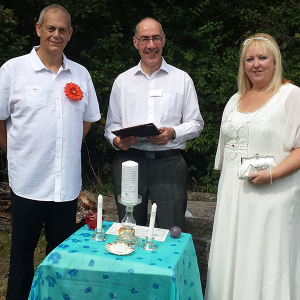
Civil Celebrant limitations
I am often asked what limits my availability, as regards location. Well, I can’t conduct a service in a C of E church, but that’s about it. Any other location – from hotels and restaurants to the Stonehenge inner circle, to a mountain top, a canalside, a back garden or underwater ( think creative!) – all these are technically available for wedding ceremonies.
Personal availablity
I live in Harrow, so I tend to work mostly in London, Herts. and Bucks., but I have conducted other ceremonies in Salisbury, Andover, Worthing , Epsom and the like. I guess that I haven’t been further afield because travel expenses inflate the fee. However, I was invited to conduct a wedding blessing in Ibiza last year – unfortunately, to my great regret, I had a clash of dates.
If you’re not planning to have your celebration in the South of England, don’t let it deter you from asking me for a quote. I’d love to help make your big day really special, wherever you choose. I can be surprisingly flexible!
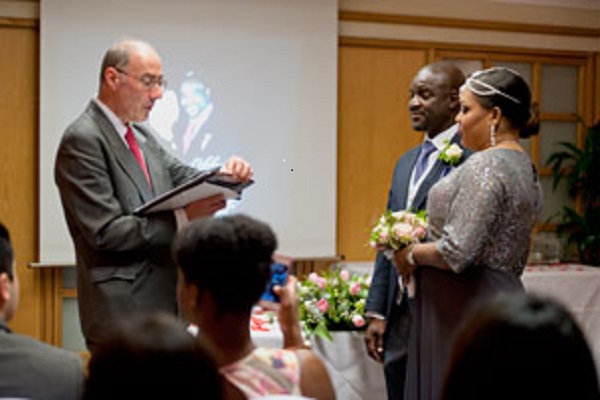
by Michael | Jan 13, 2015 | Blog
Whether priest, registrar or civil celebrant, your officiant can make or break your wedding day. It’s so important that you can relate to them and trust them. With a priest or a registrar, you don’t have much choice. But you can choose your civil celebrant.
The vital question therefore is: how do I choose the right one?
Which officiant?
Obviously, your wishes, beliefs and budget are all factors.
A religious ceremony is just that – and it follows a set formula which allows little room for personalisation.
The same applies to register office weddings – exceptthat there may be no religious mentions at all.
To get the best of both worlds, you can combine register office (or a religious service) and civil ceremony. For example, hold the (legal) wedding in the morning and then have the ceremony that actually fits with your dreams later in the day.
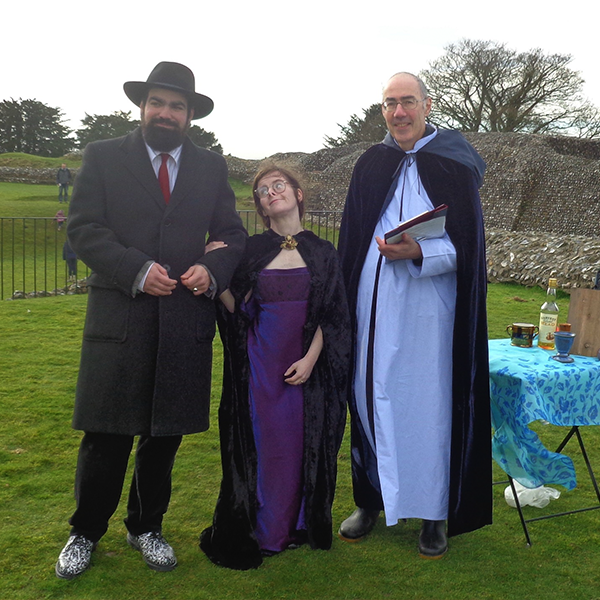
Would you like something a bit different, perhaps?
You certainly should be free to choose the type of ceremony you’ll be having – especially on the most important day of your life. You may have to compromise (with parents, for example). However, ideally, the service should be a deeply personal experience that reflects both your and your partner’s beliefs, values and style.
That’s why you may opt for a civil celebrant. So how do you choose the right one for you?
Find your Civil Celebrant
You may already know of a celebrant through a referral, say. Otherwise, you will probably turn to Google. You can look under affiliated groups (eg UK SoC, British Humanist Association, etc.). People listed there will have been trained and offer minimum (actually, often excellent) standards. Otherwise, you might key in “Civil Celebrant Harrow” and, hopefully, “Vows That Wow” will appear!
Check your Celebrant out
Once you’ve found a possibility or two, have a look at their website. Read the testimonials, but, possibly more important, see their video. This will give you an idea of the sort of person they are. You will not want to work with someone you feel uncomfortable with!
What to find out
Having settled on your celebrant, these are things you need to know:
- First, establish if the celebrant is free on the date you have in mind
- If so, check if they will travel
- Ask about legal requirements, as licensed premises have strict rules
- Of course, you need a quote (although trusting and liking them should be more important)
- Ask how they operate – ie is there an initial meeting (where?) – and what the fee includes
- Try and get a sense of their experience, enthusiasm and character (just as there are many different sorts of ceremonies, so civil celebrants have different personalities)
- Check how flexible the ceremony may be (eg can you write your own vows?)
- You may want to ask about length of ceremony (although this will very much depend on your requirements)
If you feel happy that you would like this celebrant to conduct your ceremony, then your gut feeling is probably the thing to go with. However, make sure you read and understand their Terms & Conditions. There shouldn’t be any nasty surprises, especially with a bona fide professional, but it’s always as well to be vigilant.
Working with a professional will be a pleasure. You will be free to enjoy the unforgettable, unique experience that is so precious. A good civil celebrant should be able to provide precisely what you are looking for.








